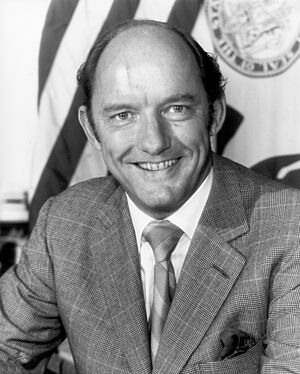Malcolm Wallop facts for kids
Quick facts for kids
Malcolm Wallop
|
|
|---|---|
 |
|
| United States Senator from Wyoming |
|
| In office January 3, 1977 – January 3, 1995 |
|
| Preceded by | Gale W. McGee |
| Succeeded by | Craig Thomas |
| Member of the Wyoming Senate |
|
| In office July 6, 1973 – June 5, 1976 |
|
| Preceded by | John S. Wold |
| Succeeded by | Craig L. Thomas |
| Member of the Wyoming House of Representatives |
|
| In office January 6, 1969 – July 2, 1973 |
|
| Personal details | |
| Born | February 27, 1933 New York City, New York, U.S. |
| Died | September 14, 2011 (aged 78) Big Horn, Wyoming, U.S. |
| Political party | Republican |
| Spouses |
Vail Stebbins
(m. 1956; div. 1965)Judith Warren
(m. 1967; div. 1981)French Carter Gamble Goodwyn
(m. 1984; div. 2001)Isabel Brooke Thomasson Ferguson
(m. 2005) |
| Children | 4 |
| Relatives | Jean Herbert, Countess of Carnarvon (sister) Oliver Wallop, 8th Earl of Portsmouth (grandfather) |
| Alma mater | Yale University Cate School |
| Occupation | cattle rancher |
Malcolm Wallop (born February 27, 1933 – died September 14, 2011) was an American rancher and politician. He was a U.S. Senator for Wyoming from 1977 to 1995. He belonged to the Republican Party.
Contents
Malcolm Wallop's Early Life
Malcolm Wallop was born in New York City. He grew up in Big Horn, Wyoming, where he attended public schools. He later went to the Cate School in Carpenteria, California.
After high school, he studied at Yale University, graduating in 1954. From 1955 to 1957, Wallop served in the U.S. Army as a first lieutenant.
Malcolm Wallop's Political Career
After leaving the Army, Wallop became a cattle rancher in Wyoming. He started his political career in 1969. He was elected to the Wyoming House of Representatives and served there until 1972. Then, he served in the Wyoming State Senate from 1973 to 1976.
In 1974, Wallop tried to become the governor of Wyoming, but he did not win the primary election.
Serving in the U.S. Senate
In 1976, Malcolm Wallop successfully ran for a seat in the United States Senate. He won against the sitting Democratic Senator, Gale W. McGee. Wallop promised to serve only two terms, but he ended up serving three terms.
During his time in the Senate, Wallop supported strong national security. He also worked on tax reform, which included reducing taxes on estates and gifts. These ideas were part of the Reagan conservatism movement.
While in the Senate, Wallop was part of several important committees. These included the Senate Judiciary Committee and the Energy and Natural Resources Committee. He also served on the United States Senate Select Committee on Intelligence, which deals with national security information. From 1981 to 1983, he led the Senate Select Committee on Ethics.
One of Wallop's notable achievements was creating the Congressional Award program. This program recognizes young Americans for their volunteer work and public service. He also helped change laws like the Surface Mining Control Act. This change made sure property owners were paid if regulations stopped them from mining. He also helped amend the Clean Water Act to protect states' rights.
In 1981, Wallop's bill to cut inheritance and gift taxes became a key part of President Ronald Reagan's tax plan. This was a big change in tax policy. He also helped get rid of President Jimmy Carter's windfall profits tax a few years earlier.
In 1982, Wallop was re-elected to the Senate. He won by a large margin against Rodger McDaniel. In his second term, Wallop supported the Strategic Defense Initiative in 1983. This was a plan for a missile defense system to protect the U.S. from nuclear attacks.
In 1988, Wallop won his final term by a very small number of votes. In his last term, he was very involved in discussions about foreign policy and trade. He was part of the Helsinki Commission. He traveled to Eastern Europe and the former Soviet Union to work on arms control agreements. Wallop also strongly supported the General Agreement on Tariffs and Trade (GATT) and the U.S. joining the World Trade Organization.
From 1990 to 1994, he was a top Republican member of the Senate Energy and Natural Resources Committee. In 1992, he played a key role in passing the important Energy Policy Act.
In 1994, Wallop decided not to run for a fourth term. Craig Thomas took his place in the Senate. When he retired, a magazine called The Economist said that even his opponents respected his honesty and willingness to speak his mind.
After the Senate
After retiring from the Senate in 1995, Malcolm Wallop started the Frontiers of Freedom Institute. This group works to support limited government and a strong national defense.
In 1996, Wallop was a key leader in Steve Forbes's presidential campaign.
Honors and Recognition
- In 2010, the University of Wyoming created the Malcolm Wallop Fund for Conversations on Democracy. This fund supports speakers and workshops for students.
- The University of Wyoming's American Heritage Center keeps Wallop's important papers and documents.
Malcolm Wallop's Personal Life
Malcolm Wallop was married four times and had four children. His sister, Jean, married Henry Herbert, 7th Earl of Carnarvon. Lord Carnarvon was a friend of Queen Elizabeth II. In 1984, Queen Elizabeth II visited Wallop at his ranch in Wyoming.
Wallop's nephew is George Herbert, 8th Earl of Carnarvon. His family's home in England, Highclere Castle, is famous as the filming location for the TV show Downton Abbey.
Malcolm Wallop passed away in Big Horn, Wyoming, in 2011 at the age of 78, after a long illness.
 | Emma Amos |
 | Edward Mitchell Bannister |
 | Larry D. Alexander |
 | Ernie Barnes |

